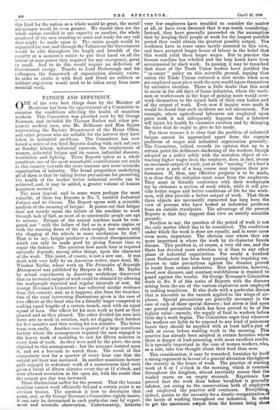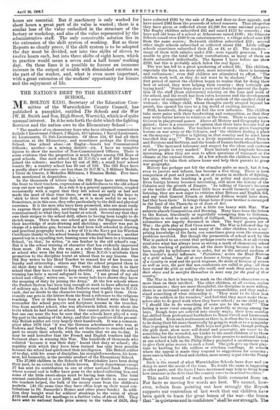FATIGUE AND EFFICIENCY.
ONE of the very best things done by the Ministry of Munitions has been the appointment of a Committee to examine the conditions affecting the health of munition workers. This Committee was presided over by Sir George Newman, and included Sir Thomas Barlow and other pro- minent medical men, also Mr. Bellhouse and Miss Squire representing the Factory Department of the Home Office, and other persons who are notable for the interest they have taken in industrial problems. The Committee has now issued a series of ten brief Reports dealing with such sub:eats as Sunday labour, industrial canteens, the employment of women, industrial fatigue and its causes, industrial diseases, ventilation and lighting. These Reports taken as a whole constitute one of the most remarkable contributions yet made in this country towards the more humane and more scientific organization of industry. The broad proposition underlying all of them is that by taking better precautions for preserving the health of the worker better industrial results can be achieved, and, it may be added, a greater volume of human happiness secured.
The most typical, and in some ways perhaps the most valuable, of these ten Reports is No. 7, entitled Industrial Fatigue and its Causes. The Report opens with a scientific analysis of the meaning of fatigue. It points out that fatigue does not merely mean the failure of the machine to work through lack of fuel, as most of us unscientific people are apt to assume. Fatigue of the animal machine must be com- pared, not "with the failure of fuel as in a steam engine or with the running down of the clock-weight, but rather with the clogging of the 3vheels in some mechanism by dirt." That is to say, fatigue produces a chemical disorganization which can only be made good by giving Nature time to repair the balance. The question how much time is required naturally depends, among other things, upon the character of the work. This point, of course, is not a new one. It was dealt with very fully by an American writer, since dead, Mr. Winslow Taylor, whose work on The Principles of Scientific Management was published by Harpers in 1914. Mr. Taylor by actual experiments in American workshops discovered that an increased output of work could be obtained by allowing the workpeople repeated and regular intervals of rest. Sir George Newman's Committee has collected similar evidence from this country, and, as it happens, also from the trenches. One of the most interesting illustrations given is the case of two officers at the front who for a friendly wager competed in making equal lengths of a certain trench, each with an equal squad of men. One officer let his men work as hard as they pleased and as they pleased. The other divided his men into three sets to work in rotation, each set digging their hardest for five minutes and then resting for ten minutes. The latter team won easily. Another case is quoted of a large munitions factory where the management required the men engaged in the heavy work of moulding to rest for fifteen minutes in every hour of work. As they were paid by the piece, the men objected to this arrangement ; but the manager insisted upon it, and set a foreman to watch them. The result of this compulsory rest for a quarter of every hour was that the output per hour was increased. In another munitions factory girls engaged in sedentary work of a monotonous kind were given a break of fifteen minutes every day at 11 o'clock, and were allowed recreation in the open air, with the result that the output per day was increased.
These illustrations suffice for the present. That the human machine cannot work efficiently beyond a certain point is an obvious truism. The question is how to determine that point, and, as Sir George Newman's Committee rightly insists, it can only be determined in each particular case by experi- ment and scientific observation. Unfortunately, hitherto very few employers have troubled to consider the matter at all, or have even dreamed that it was worth considering. Instead, they have generally proceeded on the assumption that by keeping their people at work for the longest possible period they could obtain the greatest possible output. The workmen have in some cases tacitly assented to this view, and have accepted longer hours of labour in the belief that this would yield them larger wages. But in practice the human machine has rebelled and the long hours have been accompanied by slack work. In passing, it may be remarked that some of the Trade Union leaders have justified the " ca-canny " policy on this scientific ground, arguing that unless the Trade Unions enforced a slow stroke when men are employed upon piece work the men would injure themselves by excessive exertion. There is little doubt that this used to occur in the old days of home industries, where the work- men or workwomen in the hope of gaining more would over- work themselves to the injury both of their own bodies and of the output of work. Even now if inquiry were made it would be found that such incidents are not uncommon. For example, where agricultural labourers are employed upon piece work it not infrequently happens that a labourer will injure his health by excessive exertion and by skimping the time that he ought to give to his meals.
For these reasons it is clear that the problem of industrial fatigue cannot be approached apart from the cognate problems of wages and industrial organization generally. The Committee, indeed, records its opinion that up to a certain point the deliberate slackening of the workers, though adopted as a policy solely with the mistaken object of ex- tracting higher wages from the employer, does, in fact, secure an increased output of work, just as the " nursing" of a boat's crew over a part of a long course may improve their per- formance. If, then, any effective progress is to be made, it is clear that the initiative must come from the employers. They must in friendly conference with their workpeople try to elaborate a system of work which, while it will pro- vide better wages and better conditions of life for the work- men, will also provide a better output of work. That these three objects are necessarily connected has long been the view of persons who have looked at industrial problems from an outside standpoint. The advantage of the present Reports is that they support that view on strictly scientifie grounds.
Needless to say, the question of the period of work is not the only matter which has to be considered. The conditions under which the work is done are equally, and in some cases even more, important. The obvious case where they are more important is where the work by its character breeds disease. This problem is, of course, a very old one, and the State has devoted more attention to it than to any other phase of industrial organization. For nearly a hundred years Parliament has been busy passing Acts requiring em- ployers to take precautions against the diseases proved to result from certain industries. New industries, however, breed new diseases, and constant watchfulness is required to guard against the results. Sir George Newman's Committee deals in No. 8 of this series of Reports with the diseases arising from the use of the various explosives now employed in making munitions. It also deals with a particular disease that is traceable to the varnish applied to the wings of air- planes. Special precautions are generally necessary in the case of each of these special diseases ; but stress is laid upon one general precaution which has been proved to be of the highest value—namely, the supply of food to workers before their day's work begins. The Committee urges that wherever the workers are liable to be exposed to any kind of poisonous fumes they should be supplied with at least half-a-pint of milk or cocoa before starting work in the morning. This practice has already been adopted in certain factories where there is danger of lead-poisoning, with most excellent results. It is specially important in the case of women workers, who, as a rule, take less thought about their food than men.
This consideration, it may be remarked, furnishes by itself a strong argument in favour of a general alteration throughout the country in the hours of work. The practice of starting work at 6 or 7 o'clock in the morning, which is common throughout the kingdom, almost inevitably means that the worker starts on an empty stomach. Experience has proved that the work done before breakfast is generally inferior, yet owing to the conservatism both of employers and employed the practice still continues. Everything, indeed, points to the necessity for a drastic reorganization of the hours of working throughout our industries. In order to get the maximuxu ostput from the human being shod hours are essential. But if machinery is only worked for short hours a great part of its value is wasted ; there is a similar loss of the value embodied in the structure of the factory or workshop, and. also of the value represented by the administrative staff. The only conceivable solution lies in the extension of the •shift system of working. But as these Reports so clearly prove, if the shift system is to be adopted the day must be divided, not into two shifts of eleven to twelve hours each, but into three shifts of eight hours, which in practice would mean a seven and a half hours' working day. On these lines it is possible to foresee an immense increase in the output of wealth with diminished exertion on the part of the worker, and, what is even more important, with a great extension of the workers' opportunity for leisure and the enjoyment of life.



























 Previous page
Previous page